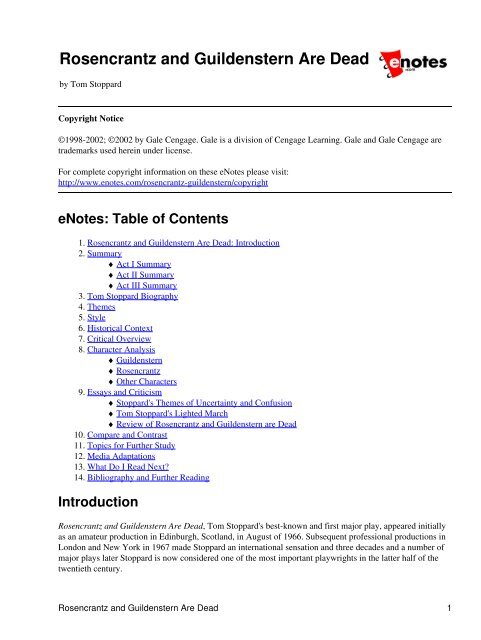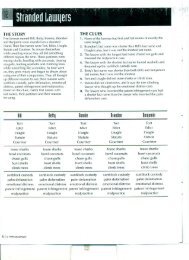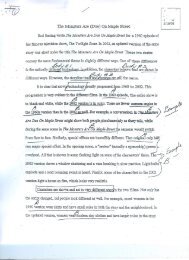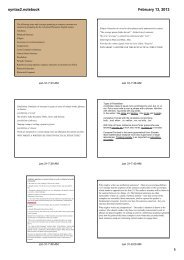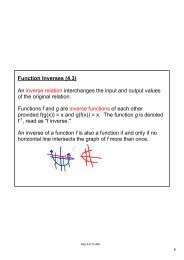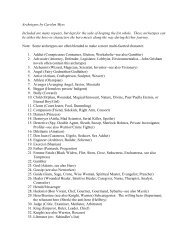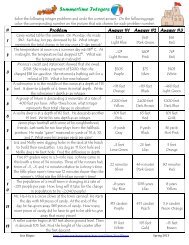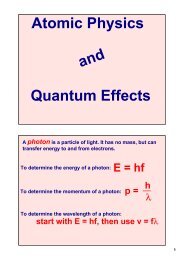Rosencrantz and Guildenstern Are Dead - Cherokee County Schools
Rosencrantz and Guildenstern Are Dead - Cherokee County Schools
Rosencrantz and Guildenstern Are Dead - Cherokee County Schools
You also want an ePaper? Increase the reach of your titles
YUMPU automatically turns print PDFs into web optimized ePapers that Google loves.
<strong>Rosencrantz</strong> <strong>and</strong> <strong>Guildenstern</strong> <strong>Are</strong> <strong>Dead</strong><br />
by Tom Stoppard<br />
Copyright Notice<br />
©1998-2002; ©2002 by Gale Cengage. Gale is a division of Cengage Learning. Gale <strong>and</strong> Gale Cengage are<br />
trademarks used herein under license.<br />
For complete copyright information on these eNotes please visit:<br />
http://www.enotes.com/rosencrantz-guildenstern/copyright<br />
eNotes: Table of Contents<br />
1. <strong>Rosencrantz</strong> <strong>and</strong> <strong>Guildenstern</strong> <strong>Are</strong> <strong>Dead</strong>: Introduction<br />
2. Summary<br />
♦ Act I Summary<br />
♦ Act II Summary<br />
♦ Act III Summary<br />
3. Tom Stoppard Biography<br />
4. Themes<br />
5. Style<br />
6. Historical Context<br />
7. Critical Overview<br />
8. Character Analysis<br />
♦ <strong>Guildenstern</strong><br />
♦ <strong>Rosencrantz</strong><br />
♦ Other Characters<br />
9. Essays <strong>and</strong> Criticism<br />
♦ Stoppard's Themes of Uncertainty <strong>and</strong> Confusion<br />
♦ Tom Stoppard's Lighted March<br />
♦ Review of <strong>Rosencrantz</strong> <strong>and</strong> <strong>Guildenstern</strong> are <strong>Dead</strong><br />
10. Compare <strong>and</strong> Contrast<br />
11. Topics for Further Study<br />
12. Media Adaptations<br />
13. What Do I Read Next?<br />
14. Bibliography <strong>and</strong> Further Reading<br />
Introduction<br />
<strong>Rosencrantz</strong> <strong>and</strong> <strong>Guildenstern</strong> <strong>Are</strong> <strong>Dead</strong>, Tom Stoppard's best-known <strong>and</strong> first major play, appeared initially<br />
as an amateur production in Edinburgh, Scotl<strong>and</strong>, in August of 1966. Subsequent professional productions in<br />
London <strong>and</strong> New York in 1967 made Stoppard an international sensation <strong>and</strong> three decades <strong>and</strong> a number of<br />
major plays later Stoppard is now considered one of the most important playwrights in the latter half of the<br />
twentieth century.<br />
<strong>Rosencrantz</strong> <strong>and</strong> <strong>Guildenstern</strong> <strong>Are</strong> <strong>Dead</strong> 1
Recognized still today as a consistently clever <strong>and</strong> daring comic playwright, Stoppard startled <strong>and</strong> captivated<br />
audiences for <strong>Rosencrantz</strong> <strong>and</strong> <strong>Guildenstern</strong> <strong>Are</strong> <strong>Dead</strong> when he retold the story of Shakespeare's Hamlet as an<br />
absurdist-like farce, focusing on the point of view of two of the famous play's most insignificant characters. In<br />
Shakespeare's play, <strong>Rosencrantz</strong> <strong>and</strong> <strong>Guildenstern</strong> are little more than plot devices, school chums summoned<br />
by King Claudius to probe Hamlet's bizarre behavior at court <strong>and</strong> then ordered to escort Hamlet to Engl<strong>and</strong><br />
(<strong>and</strong> his execution) after Hamlet mistakenly kills Polonius. Hamlet escapes Claudius's plot <strong>and</strong> engineers<br />
instead the executions of <strong>Rosencrantz</strong> <strong>and</strong> <strong>Guildenstern</strong>, whose deaths are reported incidentally after Hamlet<br />
returns to Denmark. In Stoppard's play, <strong>Rosencrantz</strong> <strong>and</strong> <strong>Guildenstern</strong> become the major characters while the<br />
Hamlet figures become plot devices, <strong>and</strong> Stoppard's wildly comic play becomes the story of two ordinary men<br />
caught up in events they could neither underst<strong>and</strong> nor control. Stoppard's play immediately invited<br />
comparisons with Samuel Beckett's Waiting for Godot <strong>and</strong> also brought to mind George Bernard Shaw, Oscar<br />
Wilde, <strong>and</strong> Luigi Pir<strong>and</strong>ello. "Stoppardian" is now a recognizable epithet that suggests extraordinary verbal<br />
wit <strong>and</strong> the comic treatment of philosophical issues in often bizarre theatrical contexts.<br />
Summary<br />
Act I Summary<br />
Two minor characters from Shakespeare's Hamlet are travelling to the court of King Claudius <strong>and</strong> have<br />
paused on the road to play a coin-tossing game of "heads or tails." The one named <strong>Rosencrantz</strong> has just won<br />
for the 70th consecutive time, each time betting on "heads." <strong>Rosencrantz</strong> is embarrassed to be winning so<br />
much money from his friend, <strong>Guildenstern</strong>, but <strong>Guildenstern</strong> is more concerned with the apparent violation of<br />
probability in this phenomenal run. After the string gets to 76, <strong>Guildenstern</strong> begins throwing the coins more<br />
absent-mindedly as he speculates on the possible philosophical <strong>and</strong> even religious explanations for this<br />
amazing streak.<br />
<strong>Guildenstern</strong> suggests four possibilities for this run of "heads," including simple luck since every toss has the<br />
same 50/50 odds no matter what has happened earlier. He helps <strong>Rosencrantz</strong> recall that this day began with a<br />
messenger from King Claudius insisting that they come to Elsinore, where their friend Hamlet had gone some<br />
time earlier. They hear music in the air <strong>and</strong> are soon joined by a troupe of actors, "tragedians," whose leader<br />
(the Player) tries to solicit money from them in exchange for a performance.<br />
When the Player suggests an entertainment that implies sexual participation, <strong>Guildenstern</strong> is angered but<br />
<strong>Rosencrantz</strong> is eventually intrigued <strong>and</strong> tosses a coin on the ground, asking ''what will you do for that?" The<br />
Player <strong>and</strong> <strong>Guildenstern</strong> bet on whether the coin has fallen heads or tails, exchanging tosses until the Player<br />
finally chooses tails <strong>and</strong> loses. After the Player refuses to bet any longer on the coin toss, <strong>Guildenstern</strong> tricks<br />
him into betting that the year of his birth doubled is an odd number (any number doubled is even). When the<br />
Player loses, the troupe has no money to pay the wager <strong>and</strong> must perform for free. As they are readying<br />
themselves, <strong>Rosencrantz</strong> notices that the last tossed coin turned up tails.<br />
A sudden change of light on stage indicates a shift from the present exterior scene to an interior scene in<br />
Elsinore Castle where Hamlet <strong>and</strong> Ophelia enter <strong>and</strong> perform actions from Shakespeare's famous play.<br />
<strong>Rosencrantz</strong> <strong>and</strong> <strong>Guildenstern</strong> try to leave, but Claudius, Gertrude, <strong>and</strong> the rest of the court enter speaking<br />
Shakespearian verse, trapping the two men into playing the roles they are assigned in Hamlet. <strong>Rosencrantz</strong><br />
<strong>and</strong> <strong>Guildenstern</strong> learn that King Claudius wants them to find out why Hamlet is acting so strangely. When<br />
the characters from Shakespeare's play leave, <strong>Rosencrantz</strong> <strong>and</strong> <strong>Guildenstern</strong> (now in the castle at Elsinore) are<br />
as baffled as before. To prepare for their interrogation of Hamlet, <strong>Rosencrantz</strong> initiates a question <strong>and</strong> answer<br />
game <strong>and</strong> then <strong>Guildenstern</strong> pretends to be Hamlet while <strong>Rosencrantz</strong> questions him. The first Act ends as<br />
Hamlet appears <strong>and</strong> welcomes <strong>Rosencrantz</strong> <strong>and</strong> <strong>Guildenstern</strong> to Elsinore.<br />
Introduction 2
Act II Summary<br />
As characters from Hamlet continue to come <strong>and</strong> go, <strong>Rosencrantz</strong> <strong>and</strong> <strong>Guildenstern</strong> ruminate about their<br />
continued confusion. Eventually, the Player arrives <strong>and</strong> complains about how the two courtiers disappeared<br />
(in Act I at the lighting change) when his troupe was performing. He complains that as actors he <strong>and</strong> his<br />
troupe need an audience to complete their sense of identity. Hamlet has asked the tragedians to perform The<br />
Murder of Gonzago <strong>and</strong> since the Player seems to be "a man who knows his way around," <strong>Guildenstern</strong> asks<br />
for advice. The Player tells them to accept uncertainty as a natural part of human life. As <strong>Rosencrantz</strong> <strong>and</strong><br />
<strong>Guildenstern</strong> speculate about their future, the question of control, <strong>and</strong> the nature of death, Claudius <strong>and</strong><br />
Gertrude re-enter <strong>and</strong> once again sweep <strong>Rosencrantz</strong> <strong>and</strong> <strong>Guildenstern</strong> into their Shakespearean roles. As the<br />
characters from Hamlet come <strong>and</strong> go, the acting troupe eventually returns to rehearse The Murder of Gonzago,<br />
but this rehearsal is interrupted by scenes involving other characters from Hamlet <strong>and</strong> gradually evolves<br />
beyond the rehearsal of The Murder of Gonzago as it appears in Hamlet to a summary of events that occur<br />
later in the play, including the death of Polonius <strong>and</strong> the deaths of <strong>Rosencrantz</strong> <strong>and</strong> <strong>Guildenstern</strong> themselves.<br />
<strong>Rosencrantz</strong> <strong>and</strong> <strong>Guildenstern</strong> don't quite underst<strong>and</strong> that it is their own deaths being enacted, but<br />
<strong>Guildenstern</strong> is rattled by the suggestion <strong>and</strong> accuses the actors of not underst<strong>and</strong>ing death. A blackout brings<br />
the action back to Hamlet <strong>and</strong> the frantic conclusion of The Murder of Gonzago.<br />
Suddenly it is sunrise, the next day, <strong>and</strong> Claudius enters <strong>and</strong> comm<strong>and</strong>s <strong>Rosencrantz</strong> <strong>and</strong> <strong>Guildenstern</strong> to<br />
accompany Hamlet to Engl<strong>and</strong>. As <strong>Rosencrantz</strong> <strong>and</strong> <strong>Guildenstern</strong> wonder about how to find Hamlet, he<br />
appears, dragging the body of Polonius. They join their two belts to capture him, but Hamlet evades them as<br />
<strong>Rosencrantz</strong>'s trousers fall down. Eventually, Hamlet is brought to Claudius by others <strong>and</strong> the stage lighting<br />
changes once more to reveal that <strong>Rosencrantz</strong> <strong>and</strong> <strong>Guildenstern</strong> are again outdoors. They are taking Hamlet to<br />
Engl<strong>and</strong>.<br />
Act III Summary<br />
Act III opens in pitch darkness with soft sea sounds <strong>and</strong> sailor voices indicating that <strong>Rosencrantz</strong> <strong>and</strong><br />
<strong>Guildenstern</strong> are on a boat. Gradually, light pirates attack the ship <strong>and</strong> in the confused battle that follows<br />
Hamlet, the Player, <strong>and</strong> <strong>Rosencrantz</strong> <strong>and</strong> Guildenslern leap into the three barrels. After the fight is over, only<br />
the Player <strong>and</strong> <strong>Rosencrantz</strong> <strong>and</strong> <strong>Guildenstern</strong> reappear. Hamlet is now gone, but as <strong>Rosencrantz</strong> <strong>and</strong><br />
<strong>Guildenstern</strong> look at the letter again they discovered that the letter Hamlet substituted now instructs the King<br />
of Engl<strong>and</strong> to put them to death. All the players re-emerge from one of the barrels <strong>and</strong> form a menacing circle<br />
around <strong>Rosencrantz</strong> <strong>and</strong> <strong>Guildenstern</strong>. The Player offers philosophizing words, but the enraged <strong>Guildenstern</strong><br />
snatches a dagger from his belt <strong>and</strong> stabs the Player in the throat, appearing to kill him. However, the dagger<br />
is retractable, the Player rises, <strong>and</strong> the tragedians act out several kinds of deaths as the light dims, leaving only<br />
<strong>Rosencrantz</strong> <strong>and</strong> <strong>Guildenstern</strong> on stage. <strong>Rosencrantz</strong> proclaims that he has "had enough" <strong>and</strong> disappears.<br />
<strong>Guildenstern</strong> calls for his friend, realizes he's gone, <strong>and</strong> disappears himself.<br />
Immediately, the stage is flooded with light <strong>and</strong> the characters appear from the tableau of corpses that ends<br />
Shakespeare's tragedy. An Ambassador from Engl<strong>and</strong> announces that <strong>Rosencrantz</strong> <strong>and</strong> <strong>Guildenstern</strong> are dead,<br />
<strong>and</strong> Hamlet's friend, Horatio, ends the play by pointing out that "purposes mistook [have] fallen on the<br />
inventor's heads."<br />
Biography<br />
Tom Stoppard (pronounced Stop-pard, with equal accents on both syllables) was born Tomas Straussler in<br />
Czechoslovakia on July 3, 1937. His name was changed when his mother married British army major Kenneth<br />
Act II Summary 3
Stoppard after the death of the boy' s father. Educated from the age of five (in English) in India <strong>and</strong> from the<br />
age of nine in Engl<strong>and</strong>, Stoppard left school at seventeen to become a journalist before deciding in 1960, at<br />
the age of twenty-three, to become a full-time writer.<br />
Before becoming an "overnight" sensation with <strong>Rosencrantz</strong> <strong>and</strong> <strong>Guildenstern</strong> <strong>Are</strong> <strong>Dead</strong>, Stoppard worked as<br />
a freelance writer <strong>and</strong> drama critic in London, writing stage plays, television plays, radio plays, short stories,<br />
<strong>and</strong> his only novel, Lord Malquist <strong>and</strong> Mr. Moon. The turning point in his writing career came in 1963 when<br />
his agent, Kenneth Ewing, wondered in casual conversation who the King of Engl<strong>and</strong> might have been during<br />
the time of Shakespeare's Hamlet. The question prompted Stoppard to write a one-act verse burlesque entitled<br />
<strong>Rosencrantz</strong> <strong>and</strong> <strong>Guildenstern</strong> Meet King Lear, <strong>and</strong> when Stoppard participated in a writing colloquium for<br />
young playwrights in Berlin in 1964 he submitted a version of this text.<br />
Stoppard eventually discarded from this play most of the verse <strong>and</strong> the references to King Lear, gradually<br />
focusing on events in Hamlet's Elsinore. In August of 1966, Stoppard helped direct the first production of the<br />
play in Edinburgh. Though the play was "done in a church hall on a flat floor" with "no scenery" <strong>and</strong> "student<br />
actors," influential London theatre critic Ronald Bryden perceived the play's potential <strong>and</strong> wrote that<br />
Stoppard's play was "the best thing at Edinburgh so far'' <strong>and</strong> that "it's the most brilliant debut by a young<br />
playwright since John Arden." Bryden's review convinced the National Theatre in London to produce the play<br />
<strong>and</strong> Stoppard soon vaulted into international prominence.<br />
Since his phenomenal success with <strong>Rosencrantz</strong> <strong>and</strong> <strong>Guildenstern</strong> <strong>Are</strong> <strong>Dead</strong> Stoppard has produced a large<br />
body of work that critics continue to find intelligent, erudite, witty, <strong>and</strong> filled with verbal pyrotechnics. A<br />
number of early critics questioned whether this dazzling surface was supported by genuine profundity <strong>and</strong><br />
many early critics found Stoppard's plays coldly analytical rather than emotionally powerful. But The Real<br />
Thing in 1982 <strong>and</strong> Arcadia in 1993 seemed to deliver the kind of pathos his highly intellectual "philosophical<br />
farces" might have been lacking. Though not unanimously acclaimed by critics today, Stoppard is undeniably<br />
a major figure in contemporary drama. He has also written a number of adaptations of plays in foreign<br />
languages <strong>and</strong> several screen plays, including a feature film version of <strong>Rosencrantz</strong> <strong>and</strong> <strong>Guildenstern</strong> <strong>Are</strong><br />
<strong>Dead</strong> in 1990.<br />
Themes<br />
Human Condition<br />
Stoppard's <strong>Rosencrantz</strong> <strong>and</strong> <strong>Guildenstern</strong> <strong>Are</strong> <strong>Dead</strong> blends two stories—Shakespeare's Hamlet <strong>and</strong> Stoppard's<br />
own version of how the two courtiers might have felt <strong>and</strong> behaved after they were summoned by King<br />
Claudius to spy on their schoolmate, Hamlet.<br />
When Stoppard decided to write about <strong>Rosencrantz</strong> <strong>and</strong> <strong>Guildenstern</strong> he was free to give them personalities of<br />
his own because Shakespeare had hardly given them any personalities at all. He was also free to let them<br />
speak in a more colloquial language <strong>and</strong> to elaborate on aspects of their lives that Shakespeare did not specify,<br />
such as what they might have done with Hamlet on the ship to Engl<strong>and</strong>. But once Stoppard chose to blend his<br />
story with Shakespeare's, <strong>Rosencrantz</strong> <strong>and</strong> <strong>Guildenstern</strong> were fated to die at the end of Stoppard's story<br />
because they die at the end of Shakespeare's. Stoppard uses this literary fatalism as a metaphor for the fate that<br />
awaits all human beings—the inevitability of death.<br />
The play begins with Stoppard's story, as two very un-Shakespearean courtiers flip coins as they pause on the<br />
road to Elsinore. The extraordinary suspension of the laws of probability that permits over 100 coins to l<strong>and</strong><br />
"heads" before one l<strong>and</strong>s "tails" indicates that there is something special about this day. And when a coin<br />
finally l<strong>and</strong>s "tails" <strong>Rosencrantz</strong> <strong>and</strong> <strong>Guildenstern</strong> are immediately swept out of Stoppard's story <strong>and</strong> back into<br />
Shakespeare's, from which they originally came. Once they are placed in Shakespeare's story, their fate is<br />
Biography 4
sealed. They will die at the end, even though they shift back <strong>and</strong> forth from the Shakespearean to the<br />
Stoppardian story. What was special about this day is that it set in motion the events that would lead to their<br />
deaths.<br />
Fate is something that has already been decided, something humans have no control over, something that will<br />
happen whatever human beings do, <strong>and</strong> the literary fatality that comes from entering a world where events are<br />
already decided gives Stoppard the metaphor he needs for human fate. Though they resist accepting the fact,<br />
human beings are doomed to die as soon as they enter the world.<br />
When the tragedians first arrive in Stoppard's story, <strong>Guildenstern</strong> says "it was chance, then ... [that] you found<br />
us," <strong>and</strong> the Player says, "or fate." Subsequent references to "getting caught up in the action" of the<br />
Shakespeare play are frequent, as are references to not having any "control." And when the Player says in<br />
their dress rehearsal for The Murder of Gonzago that "everyone who is marked for death dies," <strong>Guildenstern</strong><br />
asks, "Who decides?" <strong>and</strong> the Player responds, "Decides? It is written.''<br />
Art <strong>and</strong> Experience<br />
Stoppard elaborates on the theme of fate by exploring the relationship between art <strong>and</strong> experience.<br />
Throughout the play, he uses the tragedians <strong>and</strong> their spokesperson, the Player, to emphasize that art can<br />
create an illusion that is often more real <strong>and</strong> convincing than the experience of ordinary life.<br />
The tragedians specialize in portraying death on stage, but <strong>Guildenstern</strong> argues that their version of death is<br />
not "real." The Player responds by saying that the fictional representation of death is the only version that<br />
human beings will believe. He recalls the time he arranged for one of his actors condemned to be hanged to<br />
meet his execution on stage. However, to his surprise, the audience jeered <strong>and</strong> threw peanuts at this "real<br />
death'' <strong>and</strong> the actor couldn't accept his fate calmly, crying the whole time, "right out of character.''<br />
Sigmund Freud asserted that human beings are psychologically incapable of seeing themselves as dead. When<br />
we come close to dying in our dreams we wake up or alter the dream so we become spectators ourselves, <strong>and</strong><br />
as soon as we exist as spectators we have not in fact died. In art, however, we can experience death<br />
vicariously <strong>and</strong> safely, testing our reactions to it in a way that paradoxically rehearses us for our own death<br />
while further distancing us from the reality of it. Playing the role of spectators is perhaps as close as humans<br />
can ever get to accepting the reality of their human mortality.<br />
This assertion is demonstrated most effectively in Act III, when the frustrated <strong>Guildenstern</strong> attacks the Player<br />
<strong>and</strong> seems to stab him fatally in the neck with a dagger. Like <strong>Rosencrantz</strong> <strong>and</strong> <strong>Guildenstern</strong>, audience<br />
members initially unaware of the retractable blade in the stage dagger will experience a moment of shock<br />
when it appears that a real death has taken place on stage. But almost immediately we remember that we are at<br />
a play <strong>and</strong> that this death cannot possibly be real. When the Player comes to his feet to the applause of his<br />
fellow tragedians, the audience laughs in relief, as does <strong>Rosencrantz</strong>, who applauds <strong>and</strong> calls for an encore.<br />
Death<br />
The theme of humans denying their own mortality also helps to explain a number of problematic points in the<br />
play. When, for example, <strong>Rosencrantz</strong> <strong>and</strong> <strong>Guildenstern</strong> discover that the letter from Claudius orders Hamlet's<br />
death, the generally sympathetic <strong>and</strong> pleasant pair distance themselves from the fact <strong>and</strong> justify their<br />
non-involvement. As disagreeable <strong>and</strong> unheroic as this behavior might be, it is in keeping with Stoppard's<br />
theme. <strong>Guildenstern</strong> justifies his non-involvement by feigning acceptance of "the designs of fate," <strong>and</strong><br />
<strong>Rosencrantz</strong>'s denial of responsibility is capped with a phrase that adumbrates the end of the play— "If we<br />
stopped breathing we'd vanish." Even more problematical, perhaps, is their behavior after discovering the<br />
revised letter that orders their own deaths. Shakespeare's pair were probably ignorant of the letter's contents<br />
<strong>and</strong> surprised by their executions. <strong>Rosencrantz</strong> <strong>and</strong> <strong>Guildenstern</strong> realize they are delivering their own death<br />
warrants <strong>and</strong> do nothing to avoid it. But quite in character, <strong>Rosencrantz</strong> simply avoids thinking about it—"All<br />
Themes 5
ight, then. I don't care. I've had enough. To tell you the truth, I'm relieved,'' while <strong>Guildenstern</strong> continues to<br />
look for explanations <strong>and</strong> escape routes—"there must have been a moment ... where we could have said— no."<br />
His final words are either a continued denial of the reality of his death or an acceptance of his status as a<br />
literary character—"well, we'll know better next time."<br />
Stoppard's theme is probably best summed up by the speech that <strong>Rosencrantz</strong> makes in Act II about lying in a<br />
coffin. Quite out of the blue he says to <strong>Guildenstern</strong>, "do you ever think of yourself as actually dead, lying in a<br />
box with a lid on it?" Quite honestly <strong>and</strong> significantly, <strong>Guildenstern</strong> says "no" <strong>and</strong> <strong>Rosencrantz</strong> echoes his<br />
response. But then the usually dim-witted <strong>Rosencrantz</strong> touches on the essential problem—"one thinks of it like<br />
being alive in a box, one keeps forgetting to take into account the fact that one is dead ... which should make<br />
all the difference ... shouldn't it? I mean, you'd never know you were in a box, would you? It would be just<br />
like being asleep in a box." When human beings attempt to think about their deaths, they assume some kind of<br />
continued consciousness. Ironically, <strong>Rosencrantz</strong> demonstrates in this speech the very kind of thinking he has<br />
just categorized as "silly." After characterizing death as a kind of sleep, he associates death with a mortal<br />
dream state, complete with the possibility of waking to full consciousness <strong>and</strong> a sense of helplessness—"not<br />
that I'd like to sleep in a box, mind you, not without air." Unable to conceptualize his own death he refuses to<br />
fully accept that "for all the compasses in the world, there's only one direction, <strong>and</strong> time is its only measure."<br />
Style<br />
Comedy<br />
One of the most distinguishing features of Stoppard's <strong>Rosencrantz</strong> <strong>and</strong> <strong>Guildenstern</strong> <strong>Are</strong> <strong>Dead</strong> is the way it<br />
moves in <strong>and</strong> out of the plot of Shakespeare's Hamlet <strong>and</strong> changes tone as it does so. While Shakespeare's<br />
play has many moments of rich humor, it is basically serious <strong>and</strong> tragic, while Stoppard's treatment of the<br />
Shakespearean story is distinctly comic, even farcical.<br />
Much of Stoppard's comedy comes, then, from the implicit contrast with Shakespearean solemnity. As the<br />
most famous tragedy of the most respected playwright in the history of the world, Hamlet conjures up an<br />
image of high seriousness, but when we meet Stoppard's courtiers at the beginning of his play they are<br />
casually flipping coins <strong>and</strong> speaking in colloquial, informal prose rather than Shakespearean verse. The<br />
rag-tag tragedians add even more contrast with Shakespearean seriousness, especially when they descend in<br />
their financial desperation to the suggestion of a pornographic exploitation of little Alfred. However, when the<br />
two courtiers are sucked into the Shakespearean action <strong>and</strong> must mingle with characters speaking<br />
Shakespearean blank verse, they begin speaking the same way <strong>and</strong> the sharp contrast with their informal<br />
speech creates a comical effect both going <strong>and</strong> coming. Their inability to escape the Hamlet plot is comic, as<br />
is what appears to be a posturing attempt to fit into it when they can't escape. Finally, they are comic when<br />
they deflate again to their non-heroic stature after the Hamlet characters disappear. In their first entry into the<br />
Shakespearean world, Stoppard indicates that the two courtiers are "adjusting their clothing" before they<br />
speak, <strong>and</strong> as they use the lines given them in Shakespeare's play, their inflated style is comic because it<br />
seems postured <strong>and</strong> implies desperate ineptitute. Then, back in their Stoppardian world, they are once again<br />
comically unheroic, as <strong>Rosencrantz</strong> whines, "I want to go home," <strong>and</strong> <strong>Guildenstern</strong> puts on his comical<br />
bravado, unconvincingly attempting to appear in control.<br />
But if <strong>Rosencrantz</strong> <strong>and</strong> <strong>Guildenstern</strong> are comically foolish because they seem overwhelmed by the power of<br />
the Shakespearean world, they are also comically noble because their ordinary presence seems eventually to<br />
deflate that Shakespearean high seriousness. It is as if their ordinary, prosaic quality begins to acquire a<br />
nobility of its own, <strong>and</strong> in contrast the Shakespearean characters eventually begin to sound exaggerated, even<br />
a little silly. This impression finds its culmination in Act III, when Hamlet is discovered lounging under a<br />
gaudily striped umbrella, reduced to something not quite classically Shakespearean. There is thus in<br />
Stoppard's play a kind of comic victory for the underdog, perhaps most clearly expressed at the beginning of<br />
Style 6
Act II when <strong>Rosencrantz</strong> responds to Hamlet's esoteric Shakespearean language by saying, "half of what he<br />
said meant something else, <strong>and</strong> the other half didn't mean anything at all." Generations of readers <strong>and</strong><br />
theatre-goers who have silently struggled at times to underst<strong>and</strong> the dem<strong>and</strong>ing dialogue of "the world's<br />
greatest playwright <strong>and</strong> the world's greatest play'' chuckle as the ordinary man speaks up.<br />
Parody<br />
Thus, we are led also to parody as a source of Stoppard's humor in <strong>Rosencrantz</strong> <strong>and</strong> <strong>Guildenstern</strong> <strong>Are</strong> <strong>Dead</strong>.<br />
Stoppard's references to other literary texts are numerous <strong>and</strong> subtle, but parody as a literary style frequently<br />
imitates a serious work in order to demean it. Stoppard's parody is distinctive because it is generally quite<br />
respectful <strong>and</strong> affectionate toward its source rather than critical.<br />
Apart from his parodic use of Shakespeare's Hamlet, Stoppard is most clearly parodying Samuel Beckett's<br />
Waiting for Godot, whose two main characters, Vladimir <strong>and</strong> Estragon, play word games <strong>and</strong> "pass the time"<br />
as they wait for someone who never arrives. Beckett's play begins on a country road that is distinctly<br />
non-descript, so when Stoppard specifies in his opening stage directions that "two Elizabethans [are] passing<br />
the time in a place without any visible character" it is sufficient to recall Waiting for Godot for those who are<br />
very familiar with the Beckett classic. However, if this reference is missed, Stoppard includes another<br />
reference later in the play that is even less mistakable. Near the end of Act II, when Hamlet is dragging<br />
Polonius's body across the stage, <strong>Rosencrantz</strong> <strong>and</strong> <strong>Guildenstern</strong> unfasten their belts <strong>and</strong> hold them taut to form<br />
a trap for Hamlet. This comes to naught as Hamlet avoids them, but the parodic comedy sparkles when<br />
<strong>Rosencrantz</strong>'s trousers fall down, recalling a similar scene at the end of Waiting for Godot. The parody is not<br />
intended to satirize Beckett's play or either pair of characters. If anything it ennobles both, paying respects to<br />
Beckett's genius, as in an "homage," <strong>and</strong> dignifying the silliness of <strong>Rosencrantz</strong> <strong>and</strong> <strong>Guildenstern</strong>. With his<br />
buddy's trousers comically gathered at his ankles <strong>and</strong> facing another complete failure, <strong>Guildenstern</strong> says quite<br />
simply, "there's a limit to what two people can do."<br />
Apart from the simple pleasure of recognition that such parody provides a knowing audience, this parody<br />
enlarges the suggestiveness of Stoppard's text. His two ordinary men are not to be taken as victims of an<br />
absurdist world, as Beckett's are. <strong>Rosencrantz</strong> <strong>and</strong> <strong>Guildenstern</strong> live in a simpler world where the inevitability<br />
of death is not tragic but a natural part of life. If human beings can calm their minds, they will realize that it is<br />
"silly to be depressed" by death, that "it would be just like being asleep in a box." When, at the beginning of<br />
the play, <strong>Rosencrantz</strong> exults that eighty-five consecutive winning calls of heads has "beaten the record,"<br />
<strong>Guildenstern</strong> says "don't be absurd," <strong>and</strong> the clever allusion to Beckett speaks volumes to those who catch the<br />
joke.<br />
Historical Context<br />
The Turbulent Sixties <strong>and</strong> Stoppard as a Political Playwright<br />
The year 1966, like rest of the mid-1960s, was extremely turbulent both socially <strong>and</strong> politically. U.S.<br />
involvement in the Vietnam War, for example, aroused world-wide protest as the Chairman of the U.S. Senate<br />
Foreign Relations Committee, J. W. Fulbright, challenged the legality of America's military involvement in<br />
Southeast Asia <strong>and</strong> even Pope Paul VI pled for an end to hostilities. In America, the National Organization for<br />
Women (NOW) was founded by Betty Friedan to gain equal rights for women, <strong>and</strong> the civil rights movement<br />
for American blacks was spurring race riots in Clevel<strong>and</strong>, Chicago, <strong>and</strong> Atlanta. The 1964 Civil Rights Act<br />
was being openly defied by Southern states refusing to desegregate schools <strong>and</strong> the University of Mississippi's<br />
first black graduate, James Meredith, was shot while participating in a Mississippi voting rights march.<br />
Meanwhile, Massachusetts voters elected Edward Brooke the first black U.S. senator since Reconstruction.<br />
Closer to home for Stoppard, Engl<strong>and</strong> was responding to dem<strong>and</strong>s for independence from Rhodesia <strong>and</strong><br />
conflicts heated up between Protestants <strong>and</strong> Catholics in Northern Irel<strong>and</strong>.<br />
Historical Context 7
But in the midst of this social <strong>and</strong> political turmoil, <strong>Rosencrantz</strong> <strong>and</strong> <strong>Guildenstern</strong> <strong>Are</strong> <strong>Dead</strong> displays no<br />
interest in the social <strong>and</strong> political issues of its time. And for many years after his initial success, Stoppard<br />
seemed to write from a steadfastly apolitical point of view, claiming, perhaps puckishly, that "I must stop<br />
compromising my plays with this whiff of social application. They must be entirely untouched by any<br />
suspicion of usefulness. I should have the courage of my lack of convictions."<br />
As a result, the work following <strong>Rosencrantz</strong> <strong>and</strong> <strong>Guildenstern</strong> <strong>Are</strong> <strong>Dead</strong>—including such plays as The Real<br />
Inspector Hound (1968), Jumpers (1972), <strong>and</strong> Travesties (1974)—seemed to a number of critics to lack<br />
political <strong>and</strong> social awareness. Stoppard's drama was seen by many as dazzling in its display of ingenuity <strong>and</strong><br />
word play <strong>and</strong> interesting in its often arcane subject matters but ultimately superficial. Influential British<br />
theatre critic Kenneth Tynan summed up this assessment succinctly, calling Stoppard "a cool, apolitical<br />
stylist," referring to Travesties as "a triple-decker bus that isn't going anywhere."<br />
But in a flurry of plays in the late 1970s, starting with Every Good Boy Deserves Favor (1977), Stoppard<br />
silenced these critics by writing several plays dealing explicitly with political issues <strong>and</strong> themes. Every Good<br />
Boy Deserves Favor is set in a Russian prison hospital where one of the inmates is imprisoned for his political<br />
beliefs. Professional Foul (1977) is set in Czechoslovakia <strong>and</strong> deals with political dissidents in a totalitarian<br />
society. Night <strong>and</strong> Day (1978) takes place in a fictionalized African country <strong>and</strong> examines the role of the press<br />
in a dictatorial third-world country while Cahoot's Macbeth (1979) concerns the repression of theatre in<br />
Czechoslovakia. Though not considered major plays in the Stoppard canon, these works clearly demonstrated<br />
Stoppard's capacity for engaging contemporary social <strong>and</strong> political issues.<br />
The Tradition of the Theatre of the Absurd<br />
When <strong>Rosencrantz</strong> <strong>and</strong> <strong>Guildenstern</strong> <strong>Are</strong> <strong>Dead</strong> appeared in 1966, its possible connections to the Theatre of<br />
the Absurd were seen immediately, in part because of Stoppard's conscious echoing of Beckett's classic<br />
Waiting for Godot. But subsequent assessments have suggested that Stoppard's connection with this literary<br />
context is more problematical than initial identifications would have suggested.<br />
The Theatre of the Absurd arose after World War II <strong>and</strong> flourished in the 1950s <strong>and</strong> early 1960s, initially <strong>and</strong><br />
especially in France in the works of Eugene Ionesco (E-on-S'-co), Jean Genet (Shuh-nay'), <strong>and</strong> Samuel<br />
Beckett. These <strong>and</strong> other playwrights rejected the concept of a rational <strong>and</strong> ordered universe <strong>and</strong> tended to see<br />
human life as absurd <strong>and</strong> lacking purpose. To express this vision effectively, these dramatists tended to<br />
eliminate reassuring dramatic elements like logical plot development, realistic characterization, <strong>and</strong> rational<br />
dialogue, replacing them with bizarre qualities that forced audiences to experience absurdity first h<strong>and</strong>.<br />
And in 1968, Stoppard acknowledged the impact that Beckett <strong>and</strong> others had had on writers of his generation,<br />
saying "it seemed clear to us, that is to say the people who began writing about the same time that I did, about<br />
1960, that you could do a lot more in the theatre than had been previously demonstrated. Waiting for<br />
Godot—there's just no telling what sort of effect it had on our society, who wrote because of it, or wrote in a<br />
different way because of it."<br />
By the mid-1960s, the Theatre of the Absurd had lost much of its shock value <strong>and</strong> was already becoming<br />
outmoded, taking its last flourish in America from the early work of Edward Albee. But in 1966 <strong>and</strong> 1967,<br />
many critics saw Stoppard as a late example of this absurdist movement, with Charles Marowitz asserting in<br />
May of 1967 that Stoppard's play eventually became "a blinding metaphor about the absurdity of life."<br />
However, later assessments have suggested that Stoppard uses the Theatre of the Absurd more for comic<br />
effects than philosophical meaning. Critics like William Gruber eventually observed that <strong>Rosencrantz</strong> <strong>and</strong><br />
<strong>Guildenstern</strong> are given the opportunity for meaningful action (when they discover the letter condemning<br />
Hamlet) <strong>and</strong> lack the courage or character to act responsibly. And in Beyond Absurdity: The Plays of Tom<br />
Stoppard (1979), Victor Cahn makes the case that "<strong>Rosencrantz</strong> <strong>and</strong> <strong>Guildenstern</strong> <strong>Are</strong> <strong>Dead</strong> is a significant<br />
Historical Context 8
step in moving theatre out of the abyss of absurdity." Though certainly working in the context of the absurdist<br />
theatre movement of the 1950s <strong>and</strong> early 1960s, Stoppard's first major drama must not be too easily subsumed<br />
under its heading.<br />
Critical Overview<br />
When <strong>Rosencrantz</strong> <strong>and</strong> <strong>Guildenstern</strong> <strong>Are</strong> <strong>Dead</strong> premiered in Edinburgh <strong>and</strong> London in August of 1966 <strong>and</strong> in<br />
April of 1967, Tom Stoppard was immediately recognized as a major contemporary playwright. The<br />
cleverness in the concept of the play, its verbal dexterity, <strong>and</strong> its phenomenal theatricality brought its first<br />
reviewer, Ronald Bryden, to call it "the most brilliant debut by a young playwright since John Arden." Later,<br />
in London, Irving Wardle, writing for the Guardian, said that "as a first stage play it is an amazing piece of<br />
work," <strong>and</strong> in New York, Harold Clurman, reviewing the play in Nation, echoed the general sentiment by<br />
calling Stoppard's play a "scintillating debut." And Clive Barnes, the highly influential critic for the New York<br />
Times, asserted in October of 1967 that "in one bound Mr. Stoppard is asking to be considered as among the<br />
finest English-speaking writers of our stage, for this is a work of fascinating distinction."<br />
However, as enthusiastic as critics were for this dazzling first effort, they also had some very clear<br />
reservations. Generally, they thought Stoppard's play somewhat derivative, too closely linked to Beckett's<br />
Waiting for Godot, for example. Bryden found the play "an existentialist fable unabashedly indebted to<br />
Waiting for Godot" <strong>and</strong> the appreciative Clurman called it "Waiting for Godot rewritten by a university wit."<br />
Also in New York, an appreciative Charles Marowitz writing for the Village Voice added,"my only objection<br />
is that without the exhilarating stylistic device of the play-beneath-the-play, the play proper would be very<br />
much second-h<strong>and</strong> Beckett." Michael Smith, also writing for the Village Voice, applauded the play, saying<br />
"the writing is brilliantly clever, the basic trick inspires a tour de force, <strong>and</strong> the play is great fun,'' but added,<br />
"the drawback is Stoppard's attempt to push it to deep significance. The early part of the play repeatedly<br />
echoes Waiting for Godot in sound <strong>and</strong> situation but entirely lacks its resonance."<br />
Another reservation the critics voiced was the suggestion that the play's verbal dexterity <strong>and</strong> ingenious<br />
theatricality might have been all it had to offer, that underneath the dazzling surface there was very little of<br />
substance <strong>and</strong> that the play was ultimately shallow. This was suggested by Philip Hope-Wallace reviewing the<br />
first London production for the Guardian when he said, "I had a sensation that a fairly pithy <strong>and</strong> witty<br />
theatrical trick was being elongated merely to make an evening of it." And despite his generous praise for<br />
Stoppard's play, Charles Marowitz added that "much of its cross-talk is facile wordmanship that benefits<br />
accidentally from ambiguity."<br />
Writing somewhat after the initial critical response to the play, critics Robert Brustein <strong>and</strong> John Simon<br />
summed up this ambivalent response. Brustein wrote,"I advance my own reservations feeling like a spoilsport<br />
<strong>and</strong> a churl: the play strikes me as a noble conception which has not been endowed with any real weight or<br />
texture," <strong>and</strong> in a now often quoted remark, Brustein calls Stoppard's play "a theatrical parasite, feeding off<br />
Hamlet, Waiting for Godot <strong>and</strong> Six Characters in Search of an Author—Shakespeare provided the characters,<br />
Pir<strong>and</strong>ello the technique, <strong>and</strong> Beckett the tone with which the Stoppard play proceeds." Similarly, critic John<br />
Simon writing for The Hudson Review admitted that "the idea of the play is a conception of genius'' but also<br />
saw it as "squeezing large chunks of Beckett, Pinter, <strong>and</strong> Pir<strong>and</strong>ello, like sliding bulges on a python as he<br />
digests rabbits swallowed whole," finally reducing Stoppard's play to "only cleverness <strong>and</strong> charm."<br />
More than 30 years later, this ambivalent assessment continues to hang over Stoppard's work in general <strong>and</strong><br />
over <strong>Rosencrantz</strong> <strong>and</strong> <strong>Guildenstern</strong> <strong>Are</strong> <strong>Dead</strong> in particular. In varying degrees, critics have leveled similar<br />
charges upon successive major plays—Jumpers (1972), Travesties (1974), The Real Thing (1982), Hapgood<br />
(1988), <strong>and</strong> Arcadia (1993), frequently assessing them as excessively concerned with cleverness <strong>and</strong> the<br />
arcane, too cerebral, lacking in genuine emotion, <strong>and</strong> ultimately shallow when measured against a very high<br />
Critical Overview 9
st<strong>and</strong>ard of art <strong>and</strong> genius. However, the duration <strong>and</strong> accomplishments of Stoppard's career has finally<br />
affirmed his status as a major playwright. By the time Stoppard had written Jumpers <strong>and</strong> Travesties, Jack<br />
Richardson, writing in Commentary in 1974, had to admit Stoppard's pre-eminence: "since <strong>Rosencrantz</strong> <strong>and</strong><br />
<strong>Guildenstern</strong>, a play I admired but found a little too coy <strong>and</strong> dramatically forced in its darker moments,<br />
Stoppard has come closer <strong>and</strong> closer to a successful wedding of theatrical artistry <strong>and</strong> intelligence. He is<br />
already the best playwright around today, the only writer I feel who is capable of making the theatre a truly<br />
formidable <strong>and</strong> civilized experience again."<br />
In the context of a brilliant career, <strong>Rosencrantz</strong> <strong>and</strong> <strong>Guildenstern</strong> <strong>Are</strong> <strong>Dead</strong> continues to be a formidable<br />
achievement. Even by 1973, Norm<strong>and</strong> Berlin, writing in Modern Drama, could assert that Stoppard's first<br />
major play had "acquired a surprisingly high reputation as a modern classic." And within a decade of its first<br />
appearance, <strong>Rosencrantz</strong> <strong>and</strong> <strong>Guildenstern</strong> <strong>Are</strong> <strong>Dead</strong> had enjoyed over 250 productions in twenty different<br />
languages. Though a number of critics now feel that <strong>Rosencrantz</strong> <strong>and</strong> <strong>Guildenstern</strong> <strong>Are</strong> <strong>Dead</strong> is perhaps not<br />
Stoppard's best play—that some of his later work have been more complex, polished, <strong>and</strong> mature—Stoppard's<br />
first major play remains his most popular <strong>and</strong> his most widely performed.<br />
Character Analysis<br />
<strong>Guildenstern</strong><br />
In Stoppard's play, <strong>Guildenstern</strong> is the more philosophical <strong>and</strong> intellectual of the two courtiers who double as<br />
minor characters in Shakespeare's play <strong>and</strong> major characters in Stoppard's. The opening sequence of coin<br />
tossing vexes <strong>Guildenstern</strong> because he craves order <strong>and</strong> predictability in the universe. The apparent violation<br />
of probability in coin tossing drives him to seek an explanation but he attempts to remain calm when no<br />
satisfactory answers arise. He has a wry sense of humor, can be quite sarcastic, <strong>and</strong> is resilient, though he is<br />
also quick to anger <strong>and</strong> subject to panic or despondency when he finally feels overwhelmed. <strong>Guildenstern</strong><br />
likes to hear himself talk <strong>and</strong> often rambles at length, sometimes without making a lot of sense. He frequently<br />
uses parables <strong>and</strong> analogies to attempt to underst<strong>and</strong> the mysteries that confront him <strong>and</strong> he likes verbal<br />
games as a way of working things out. Wary <strong>and</strong> nervous, he likes to stay in control <strong>and</strong> questions more than<br />
his friend, <strong>Rosencrantz</strong>, whom he often badgers but ultimately is trying to protect <strong>and</strong> support with optimism<br />
whenever possible.<br />
<strong>Rosencrantz</strong><br />
<strong>Rosencrantz</strong> is a minor character in Shakespeare' s Hamlet <strong>and</strong> one of the two major characters in Stoppard's<br />
unusual version of Shakespeare's story. In Shakespeare's play, <strong>Rosencrantz</strong> is one of Hamlet's university<br />
friends from Wittenberg. With <strong>Guildenstern</strong>, he is summoned by King Claudius to come to Denmark because<br />
Hamlet, after returning to Denmark for his father's funeral <strong>and</strong> his mother's wedding, began acting quite<br />
strangely. <strong>Rosencrantz</strong> helps <strong>Guildenstern</strong> spy on Hamlet for Claudius <strong>and</strong> then is assigned with his friend to<br />
take Hamlet to Engl<strong>and</strong> after Hamlet kills Polonius. When Hamlet returns to Engl<strong>and</strong>, he reports to his friend<br />
Horatio that on the ship to Engl<strong>and</strong> he discovered Claudius' s letter ordering his death. He substituted a letter<br />
ordering the deaths of <strong>Rosencrantz</strong> <strong>and</strong> <strong>Guildenstern</strong> <strong>and</strong> escaped the ship when pirates attacked it. In Hamlet,<br />
<strong>Rosencrantz</strong> <strong>and</strong> <strong>Guildenstern</strong> are such nondescript characters that Claudius <strong>and</strong> his queen Gertrude can't<br />
distinguish between them.<br />
In Stoppard's play, <strong>Rosencrantz</strong> is the more timid of the two courtiers <strong>and</strong> considerably less reflective <strong>and</strong><br />
philosophical than his friend, <strong>Guildenstern</strong>. At the beginning of the play <strong>Rosencrantz</strong> is winning on every toss<br />
of the "heads or tails" game <strong>and</strong> is embarrassed to be taking so much money from his friend but is either<br />
oblivious or unconcerned about how unusual this streak of "heads" might be. He is relatively unreflective,<br />
Character Analysis 10
naive, innocent, even simple-minded <strong>and</strong> slow intellectually. He often ''tunes out'' when <strong>Guildenstern</strong> rambles<br />
in his philosophical talk but he is very sensitive <strong>and</strong> concerned about his friend's unhappiness. Usually, he<br />
doesn't question as much as <strong>Guildenstern</strong>, but when he underst<strong>and</strong>s their situation he generally feels more<br />
overwhelmed. However, when he senses approaching death, <strong>Rosencrantz</strong> is quietly resigned.<br />
Other Characters<br />
Alfred<br />
Alfred is a Stoppard invention who does not appear in Shakespeare's play. Alfred is a small boy, one of the six<br />
tragedians, who is highlighted in Stoppard's play because he is forced to play the feminine roles in drag <strong>and</strong><br />
finds his cross-dressing very humiliating.<br />
Ambassador<br />
The Ambassador from Engl<strong>and</strong> appears in both plays but only at the end to announce that the orders to<br />
execute <strong>Rosencrantz</strong> <strong>and</strong> <strong>Guildenstern</strong> have been carried out.<br />
Claudius<br />
In Shakespeare's play, Claudius, Hamlet's uncle, secretly murders Hamlet's father, marries Hamlet's mother,<br />
<strong>and</strong> sends for <strong>Rosencrantz</strong> <strong>and</strong> <strong>Guildenstern</strong> to gather information on Hamlet's behavior as Hamlet mopes<br />
around the court. After Hamlet kills Polonius, Claudius orders Hamlet escorted to Engl<strong>and</strong> by <strong>Rosencrantz</strong><br />
<strong>and</strong> <strong>Guildenstern</strong>, where orders in a sealed letter are supposed to have Hamlet killed.<br />
Gertrude<br />
In both Shakespeare's <strong>and</strong> Stoppard's plays, Gertrude is Hamlet's mother <strong>and</strong> the new wife of King Claudius.<br />
Hamlet<br />
The hero of Shakespeare's tragedy, Hamlet is a relatively minor character in Stoppard's play, where he drifts<br />
in <strong>and</strong> out performing actions <strong>and</strong> speaking lines from his classic role as the melancholy Dane. In Stoppard's<br />
play, Hamlet is eventually portrayed more playfully as he lounges in a deck chair.<br />
Horatio<br />
Horatio is Hamlet's best friend in Shakespeare's play. In Stoppard's comedy he exists only to deliver the last<br />
speech of the play.<br />
Ophelia<br />
Ophelia is the daughter of Polonius, who is one of the King's counselors in Hamlet. Ophelia is Hamlet's<br />
"girlfriend" in both Shakespeare's <strong>and</strong> Stoppard's plays. Almost all of her Shakespearean lines are omitted in<br />
<strong>Rosencrantz</strong> <strong>and</strong> <strong>Guildenstern</strong> <strong>Are</strong> <strong>Dead</strong> as she mimes most of her scenes.<br />
The Player<br />
If the Player has a counterpart in Shakespeare's play, he is the actor who performs the Pyrrhus speech for<br />
Hamlet in Act II, scene ii. In Stoppard's play this character is the leader of the w<strong>and</strong>ering troupe of actors who<br />
perform The Murder of Gonzago <strong>and</strong> a major character because he speaks so clearly <strong>and</strong> forcefully about<br />
reality <strong>and</strong> theatrical illusion. Proud of his acting craft but frustrated by his lack of financial success <strong>and</strong> his<br />
dependence on audience, the Player is self-assured, intense, but also sad. Like <strong>Guildenstern</strong>, the Player is<br />
philosophical but he is also practical, pragmatic, <strong>and</strong> resilient. A man experienced in the ways of the world,<br />
the Player accepts uncertainty more easily than anyone else in the play.<br />
Polonius<br />
In both Shakespeare's <strong>and</strong> Stoppard's plays, Polonius is the father of Ophelia <strong>and</strong> is killed by Hamlet when<br />
<strong>Rosencrantz</strong> 11
Hamlet mistakes him for the King. Polonius is portrayed in both plays as old, garrulous, <strong>and</strong> occasionally<br />
foolish.<br />
Soldier<br />
In both plays a soldier talks with Hamlet <strong>and</strong> identifies the Norwegian military comm<strong>and</strong>er, Fortinbras, as he<br />
marches his troops across Denmark toward Pol<strong>and</strong>. Hamlet admires Fortinbras for his bravery <strong>and</strong> Fortinbras<br />
succeeds to the throne in Denmark after both Claudius <strong>and</strong> Hamlet die.<br />
Tragedians<br />
The tragedians who perform The Murder of Gonzago in Hamlet are more child-like <strong>and</strong> playful in Stoppard's<br />
comedy, where they play musical instruments as well as miming their roles in The Murder of Gonzago.<br />
Essays <strong>and</strong> Criticism<br />
Stoppard's Themes of Uncertainty <strong>and</strong> Confusion<br />
The twentieth century could easily be summed up as an Age of Uncertainty. When it began, nearly one<br />
hundred years ago, religious certitude was already eroding, <strong>and</strong> the process has continued steadily as we<br />
approach the twenty-first century, leaving many more human beings unsure about the existence of an<br />
all-powerful, all-knowing, <strong>and</strong> all-loving divine being who guarantees the order <strong>and</strong> rationality of the<br />
universe. Two unprecedented world wars <strong>and</strong> the unleashing of atomic weapons have even made us uncertain<br />
about the continued existence of the planet. And the highly influential Freud has subtly contributed to our<br />
uncertainty with his essential message that much of what motivates us remains below the surface of our<br />
normal awareness. Perhaps most paradoxically, science, the paragon of certainty, has dominated the twentieth<br />
century, but as its discoveries advance our knowledge on both telescopic <strong>and</strong> microscopic scales science also<br />
reveals how much more we don't know <strong>and</strong> thus adds to our collective sense of uncertainty. From large issues<br />
to small, from public policy to personal lives, from those who are highly educated to those who are not, a<br />
feeling of uncertainty has come to typify our age.<br />
This sensitivity to uncertainty may very well account in part for the enormous <strong>and</strong> continued appeal of<br />
<strong>Rosencrantz</strong> <strong>and</strong> <strong>Guildenstern</strong> <strong>Are</strong> <strong>Dead</strong> because Stoppard's play focuses quite comically <strong>and</strong> movingly on<br />
this very issue. It is ultimately a play about ordinary people overwhelmed by confusion <strong>and</strong> uncertainty. In<br />
fact, in an interview with Giles Gordon in 1968, Stoppard explains that the genesis of the play came from his<br />
interest in the way <strong>Rosencrantz</strong> <strong>and</strong> <strong>Guildenstern</strong> "end up dead without really, as far as any textual evidence<br />
goes, knowing why. Hamlet's assumption that they were privy to Claudius's plot is entirely gratuitous. As far<br />
as their involvement in Shakespeare's text is concerned they are told very little about what is going on <strong>and</strong><br />
much of what they are told isn't true. So I see them much more clearly as a couple of bewildered innocents<br />
rather than a couple of henchmen, which is the usual way they are depicted in productions of Hamlet."<br />
This tale of "bewildered innocents" begins on the day they have been summoned by a king's messenger to<br />
appear at the Danish court. The messenger gave them no explanations or directions, simply orders, <strong>and</strong> their<br />
first encounter with King Claudius leaves them not much more enlightened. Speakers of colloquial prose in<br />
Stoppard's story, <strong>Rosencrantz</strong> <strong>and</strong> <strong>Guildenstern</strong> are bombarded with Claudius's Elizabethan rhetoric <strong>and</strong><br />
Stoppard's humor in this opening confrontation with the Hamlet world includes the ordinary person's<br />
admission that much of this Shakespearean language can seem incomprehensible. That it seems so to<br />
<strong>Rosencrantz</strong> <strong>and</strong> <strong>Guildenstern</strong> is obvious. As soon as the Hamlet characters have left, <strong>Rosencrantz</strong> wails, "I<br />
want to go home" <strong>and</strong> <strong>Guildenstern</strong> attempts to calm him by saying, "Don't let them confuse you," even<br />
though he is as confused <strong>and</strong> uncertain as his friend. After stuttering his reassurances to <strong>Rosencrantz</strong>,<br />
<strong>Guildenstern</strong> asks, "Has it ever happened to you that all of a sudden <strong>and</strong> for no reason at all you haven't the<br />
faintest idea how to spell the word— 'wife'—or 'house'—because when you write it down you just can't<br />
Other Characters 12
emember ever having seen those letters in that order before...?" All of us have probably had this quirky<br />
experience of uncertainty <strong>and</strong> Stoppard's evocation of it helps the audience identify with his beleaguered<br />
heroes. <strong>Rosencrantz</strong> says, nostalgically, "I remember when there were no questions" <strong>and</strong> <strong>Guildenstern</strong><br />
responds with, "There were always questions. To exchange one set for another is no great matter." And<br />
<strong>Rosencrantz</strong> perhaps responds for a twentieth-century audience when he concludes, "Answers, yes. There<br />
were answers to everything." The concept of God was once the answer to everything, but with that concept in<br />
question in the modern world, nothing, not even science or technology, has come to take its place.<br />
<strong>Guildenstern</strong> responds to his friend's nostalgic memories of certitude by pointing out that all of the answers<br />
now are "plausible, without being instinctive." In other words, in the modern world (the world of Stoppard's<br />
<strong>Rosencrantz</strong> <strong>and</strong> <strong>Guildenstern</strong>) probability replaces certitude as the ontological coin of the realm—what human<br />
beings can count on as being true. <strong>Guildenstern</strong> goes on to say that "all your life you live so close to truth, it<br />
becomes a permanent blur in the corner of your eye," which recalls his "unicorn" speech <strong>and</strong> the notion that<br />
what we regard as "real" is simply what's familiar—"reality, the name we give to the common experience.''<br />
After their first meeting with Claudius <strong>and</strong> the Danish court, the certainty that <strong>Rosencrantz</strong> <strong>and</strong> <strong>Guildenstern</strong><br />
feel is very minimal—"that much is certain—we came." Ironically, however, <strong>Guildenstern</strong>'s continued attempt<br />
to reassure his friend in this pivotal scene leads him to stumble across the only certainty that is available to all<br />
human beings—the certainty of one's own mortality. <strong>Guildenstern</strong> says, reassuringly, "The only beginning is<br />
birth <strong>and</strong> the only end is death—if you can't count on that, what can you count on?" Thus Stoppard brings his<br />
investigation of uncertainty home to his audience. On the practical level in the lives of <strong>Rosencrantz</strong> <strong>and</strong><br />
<strong>Guildenstern</strong> the questions without answers are questions like "why were we sent for, what are we supposed<br />
to do, where's Hamlet, what should we say to him, what's his problem, <strong>and</strong> where are we going now?'' As<br />
these fictional characters struggle comically with an uncertainty that seems to govern in small matters, they<br />
are gradually being drawn to their deaths <strong>and</strong> it is in their deaths that the audience can fully share their<br />
concern for uncertainty. Few of us will engage in <strong>and</strong> experience the uncertainties of power politics, but all of<br />
us will face, like <strong>Rosencrantz</strong> <strong>and</strong> <strong>Guildenstern</strong>, the uncertainties we feel about our own mortality.<br />
All of this concern for certainty <strong>and</strong> uncertainty is clear from the beginning of <strong>Rosencrantz</strong> <strong>and</strong> <strong>Guildenstern</strong><br />
<strong>Are</strong> <strong>Dead</strong> when, in one of the play's most striking <strong>and</strong> important images the coin tossing game defies the laws<br />
of probability. When over 100 coin tosses turn up a consecutive run of "heads" rather than the customary<br />
mixture of "heads" <strong>and</strong> "tails,'' <strong>Guildenstern</strong> is disturbed because the run is not "normal" or what humans are<br />
accustomed to. He has been thrust into a world he does not feel certain about. Ironically, the run of "heads"<br />
has produced a kind of certainty ("heads" turns up every time) but <strong>Guildenstern</strong> can't trust this certainty<br />
because it defies what he is familiar with. As he recalls their previous coin-tossing, he recalls that the familiar<br />
uncertainty in their game, the "luck'' or r<strong>and</strong>omness of the "heads" <strong>and</strong> "tails," came out to a roughly 50/50<br />
percentage that created a new kind of certainty. Just as "the sun came up about as often as it went down, in the<br />
long run, ... a coin showed heads about as often as it showed tails."<br />
After the coin-tossing game introduces the issue of uncertainty, the addition of the tragedians <strong>and</strong> especially<br />
the Player reinforces the theme <strong>and</strong> makes it much more explicit. To some extent out of necessity, the<br />
tragedians live more easily with uncertainty . They are out of fashion theatrically <strong>and</strong> must be ready to<br />
perform whatever an audience will pay to see. They also make their livelihood improvising <strong>and</strong> blurring the<br />
distinction between illusion <strong>and</strong> reality, so they have more toleration for uncertainty about reality. When<br />
<strong>Guildenstern</strong> complains about their uncertainty in Act II, the Player says, "Uncertainty is the normal state.<br />
You're nobody special." His advice is to "Relax. Respond ... Act natural ... Everything has to be taken on trust;<br />
truth is only that which is taken to be true. It's the currency of living. There may be nothing behind it, but it<br />
doesn't make any difference so long as it is honored."<br />
The tragedians also serve to connect the issue of uncertainty to the question of mortality. Their expertise is in<br />
portraying death <strong>and</strong> they are relatively more comfortable with the certainty of mortality. They even felt<br />
casual enough with it to attempt using the actual execution of one of their actors on stage when the action in<br />
Stoppard's Themes of Uncertainty <strong>and</strong> Confusion 13
one of their plays called for a hanging. As the Player understates it quite simply near the end of the play, "In<br />
our experience, most things end in death." They also underst<strong>and</strong> from their experience portraying death on<br />
stage that human beings believe more in the familiar illusion of mortality than they do the frightening<br />
actuality of it. When <strong>Guildenstern</strong> says,"You die so many times; how can you expect them to believe in your<br />
death," the Player responds, "on the contrary, it's the only kind they do believe. They're conditioned to it." He<br />
underst<strong>and</strong>s that given the human denial of their own mortality, fictive experiences are the only way to create<br />
"a thin beam of light that, seen at the right angle, can crack the shell of mortality."<br />
As it winds down to its conclusion, Stoppard's play focuses on this relationship between fictive death, real<br />
mortality, <strong>and</strong> the question of uncertainty. Early in the play the audience shares a feeling of uncertainty with<br />
<strong>Rosencrantz</strong> <strong>and</strong> <strong>Guildenstern</strong> when they are as much baffled by the results of the coin-tossing game, the<br />
eccentricities of the tragedians, <strong>and</strong> perhaps even by the rapid-fire Elizabethan verse of the Hamlet characters.<br />
During these periods of the play, the audience develops an empathy for the two heroes, identifying with their<br />
confusion <strong>and</strong> lack of certainty. But late in Act II, the tragedians present their version of The Murder of<br />
Gonzago <strong>and</strong> predict quite explicitly how <strong>Rosencrantz</strong> <strong>and</strong> <strong>Guildenstern</strong> will die: "a twist of fate <strong>and</strong> cunning<br />
has put into their h<strong>and</strong>s a letter that seals their deaths." At this point, even if they don't know the Hamlet story,<br />
the audience must accept the deaths of <strong>Rosencrantz</strong> <strong>and</strong> <strong>Guildenstern</strong>. But <strong>Rosencrantz</strong> "does not quite<br />
underst<strong>and</strong>'' what he has witnessed <strong>and</strong> finally says, "yes, I'm afraid you're quite wrong. You must have<br />
mistaken me for someone else." More aware but equally denying, <strong>Guildenstern</strong> simply gets angry <strong>and</strong><br />
challenges the Player: "you!— What do you know about death!" However, the audience is implicated in this<br />
denial as well, for it is a metaphor for their own refusal to accept the most certain thing in their lives. As the<br />
Player tells about his experience with the actor in his troupe actually hanged on stage during a performance,<br />
he paints a picture of an audience that could not accept real death in a place where they had become<br />
accustomed to fictive death—"audiences know what to expect, <strong>and</strong> that is all that they are prepared to believe<br />
in." From this point until the end of the play, Stoppard's audience is forced to watch fictive characters acting<br />
out the denial of their mortality. At the same time, the audience is invited to compare its own attitude toward<br />
the certainty of death with the one demonstrated by <strong>Rosencrantz</strong> <strong>and</strong> <strong>Guildenstern</strong>. When the play is over,<br />
they have witnessed yet another pair of fictive deaths <strong>and</strong> maybe have advanced ever so slightly toward being<br />
prepared for their own.<br />
Source: Terry Nienhuis, in an essay for Drama for Students, Gale, 1997<br />
Nienhuis is an associate professor of English at Western Carolina University<br />
Tom Stoppard's Lighted March<br />
At the top of his form, Tom Stoppard writes tragicomedies or comic ironies. Stoppard's top form has given us<br />
<strong>Rosencrantz</strong> <strong>and</strong> <strong>Guildenstern</strong> <strong>Are</strong> <strong>Dead</strong> (1967) <strong>and</strong> Arcadia (1993), contenders for the finest postwar<br />
English-language drama, <strong>and</strong> in neither case generic comedy, since comedy includes importantly a limited,<br />
socially satisfying resolution over <strong>and</strong> above the laughs. Because the recent brilliance of Arcadia happily<br />
implies that Stoppard may give us much more, I do not think of these two plays as bookends enclosing his<br />
life's work. At the same time, however, a close look will provide a useful awareness of Stoppard's dramatic<br />
structures <strong>and</strong> methods as well as of his preoccupations as a man of his century, his extraordinary sense of<br />
humor, <strong>and</strong> his commitment to the history of ideas as humanity's river.<br />
<strong>Rosencrantz</strong> <strong>and</strong> <strong>Guildenstern</strong> <strong>Are</strong> <strong>Dead</strong> (hereafter R&GAD ) gets a big <strong>and</strong> essential head start from the fact<br />
that Hamlet tends to be more or less a part of the cultural equipment of anyone reading or seeing R&GAD.<br />
Indeed, I can only suppose that Stoppard's play must be confusing or even incomprehensible to one who has<br />
not heard of the Shakespeare tragedy.<br />
Tom Stoppard's Lighted March 14
As a writer of the 1960's, Stoppard in this play was also indebted to Beckett's Waiting for Godot. Like<br />
Beckett's Gogo <strong>and</strong> Didi, <strong>Rosencrantz</strong> <strong>and</strong> <strong>Guildenstern</strong> are two minor characters among history's dramatis<br />
personae. Their puzzled, funny, painful, perhaps not hopeless search is for meanings, answers, causes,<br />
reasons. They spend their time, like many moderns, not deriving answers but playing the game of<br />
"Questions." Also like Didi <strong>and</strong> Gogo, one of them is weaker than the other, <strong>and</strong> they encounter Shakespeare's<br />
troupe of players where Beckett's pair meet Pozzo <strong>and</strong> Lucky. Both couples wait to find out what it's all about.<br />
Beckett's couple hope that Godot will turn up as promised (they seem to recall) <strong>and</strong> will explain things.<br />
Stoppard's team remember being "sent for'' in the dark of night by a faceless messenger from court, told to<br />
report to the king, <strong>and</strong> made to cool their heels while agonizing over what they're meant to be <strong>and</strong> do, <strong>and</strong><br />
where they will end up. The condition of all four resembles that of Sartre's existential loner, or indeed that of<br />
the early medieval bird flying from an unknown place of origin through a lighted mead-hall to an unknown<br />
destination. Each couple wants to know the significance of the relatively lighted interval.<br />
Another debt is to the make-believe realm of Jean Genet's The Balcony <strong>and</strong>, farther back, the plays of<br />
Pir<strong>and</strong>ello. For Stoppard is out to dissolve any fourth wall, any notion that art <strong>and</strong> life are distinct. R&GAD<br />
insists, frighteningly <strong>and</strong> delightfully, that art is life, illusion is reality, the mirror gives us whatever truth may<br />
be, acting is the way it is. For the imagination generating this play, as implicitly for the metafictions of the<br />
1960's—I think especially of Dons Lessing's The Golden Notebook, Vladimir Nabokov's Pale Fire, <strong>and</strong> John<br />
Fowles's The French Lieutenant's Woman—Hamlet's famous soliloquy is reworded by implication to read "to<br />
seem or not to seem." We are to forget about "to be," about objective facts or truth on any significant level.<br />
All of this abstraction barely suggests, of course, the brilliant dramaturgy with which Stoppard delights our<br />
eyes <strong>and</strong> ears in the theater. To start, we might remember that <strong>Rosencrantz</strong> <strong>and</strong> <strong>Guildenstern</strong> are such walk-on<br />
characters in Shakespeare's play as to be omitted altogether by some directors trying to save time. These two<br />
appear only seven times in Hamlet. Stoppard upends Shakespeare by putting these walk-ons at center stage,<br />
from which they are virtually never absent. The effect created is that Hamlet appears to be going on in the<br />
wings of Stoppard's play <strong>and</strong> intrudes only seven times on R&GAD. A couple of not-too-bright Oxbridge (or<br />
Heidelberg) undergraduates on a bare Beckettian stage speak 1960's colloquial prose except where Hamlet,<br />
Claudius, Polonius, Gertrude <strong>and</strong> Company drop in from time to time to speak Shakespeare's blank verse at<br />
<strong>and</strong> with them.<br />
R&GAD operates from the premise that "all the world's a stage." To drive home this point Stoppard makes<br />
strategic use of the Player <strong>and</strong> his troupe, who play a small, if necessary, part in Hamlet. Early on the Player<br />
recognizes <strong>Rosencrantz</strong> <strong>and</strong> <strong>Guildenstern</strong> as "fellow artists." Neither they nor the audience know at the time<br />
precisely what the Player means, but we all gradually learn, as Hamlet does, that "thinking makes it so."<br />
On several occasions the Player explains <strong>and</strong> demonstrates that what we see constitutes the real for us. When<br />
<strong>Guildenstern</strong> grows impatient with what he regards as the frivolous pretense of these actors, <strong>and</strong> cries out in<br />
desperation that they only pretend to die but can know nothing of real death, of ceasing to be, he seizes the<br />
Player's dagger <strong>and</strong> stabs him with it. At that moment, <strong>Rosencrantz</strong>, <strong>Guildenstern</strong>, the troupers, <strong>and</strong> the entire<br />
audience are hushed <strong>and</strong> staring at the fallen Player. When the Player then rises to the applause of his fellows<br />
he has clearly proven his point about the truth of seeming-to-be. <strong>Rosencrantz</strong> <strong>and</strong> <strong>Guildenstern</strong> <strong>and</strong> the<br />
audience have been smitten with Stoppard's thesis <strong>and</strong> we all share the realization that we are "fellow artists"<br />
inevitably in that we spend our lives constructing our own meanings. The fourth wall is gone <strong>and</strong> we <strong>and</strong> the<br />
other actors are one in the human condition.<br />
But what is this renowned human condition? In this play we must work at Stoppard's definition by juggling<br />
Calvin, Saint Augustine, <strong>and</strong> Sartre. In other words, the familiar issue of determinism vs. free will underlies<br />
this play <strong>and</strong> keeps it percolating in our heads long after the performance.<br />
Tom Stoppard's Lighted March 15
The principal manifestation of this age-old debate occurs after the Player informs <strong>Rosencrantz</strong> <strong>and</strong><br />
<strong>Guildenstern</strong> that the troupe members are not free to "decide" what they perform, for "It is written." "The bad<br />
end unhappily, the good unluckily. That is what tragedy means." Then in about one page he paraphrases what<br />
seems to be The Murder of Gonzago, the play within the play of Hamlet, which is the play within Stoppard's<br />
play. As both <strong>Rosencrantz</strong> <strong>and</strong> <strong>Guildenstern</strong> fear, however, <strong>and</strong> as we viewers realize, the Player is actually<br />
paraphrasing Shakespeare's play, from the murdering of Hamlet's father right through to the final switching of<br />
letters that culminates in the king of Engl<strong>and</strong>'s killing <strong>Rosencrantz</strong> <strong>and</strong> <strong>Guildenstern</strong>.<br />
This occasion frightens <strong>Rosencrantz</strong> <strong>and</strong> <strong>Guildenstern</strong>, combined as it is with their operating almost totally in<br />
the dark <strong>and</strong> with their play-opening experience of watching 94 consecutive coins violate the law of<br />
probability by coming up heads. But it engenders more than fear in the audience. We know, of course, that<br />
Stoppard's title marks his limitations: he cannot change the outcome that has been"written'' by Shakespeare.<br />
That much is determined.<br />
Beyond Stoppard's being confined by his predecessor, however, lie a number of similar questions about<br />
artist-creators <strong>and</strong> their creatures. How did Shakespeare alter his source? Who authored Shakespeare? In what<br />
sense is Stoppard "written"? Can we clearly separate Shakespeare's source from him as maker of Hamlet, or<br />
are artist <strong>and</strong> artifact inevitably blended <strong>and</strong> blurred, as in the case of Stoppard's choosing to have his Player<br />
create the play that turns out to be Shakespeare's Hamlet, featuring the Player <strong>and</strong> Stoppard's title-figures?<br />
Where do the mirrors <strong>and</strong> the onionskin layers of seeming begin <strong>and</strong> end? Perhaps finally (if such an adverb<br />
applies here), we in the audience want to know whether we are as doomed, as "written," as Calvin <strong>and</strong> the<br />
Player assert <strong>and</strong> as <strong>Rosencrantz</strong> <strong>and</strong> <strong>Guildenstern</strong> feel.<br />
This sense of doom descends at the end of Stoppard's play, which, as always, coincides in some sense with<br />
Shakespeare's. Just as Stoppard anticipates Shakespeare by having the Player invent Hamlet, so he alters<br />
Hamlet by having <strong>Rosencrantz</strong> <strong>and</strong> <strong>Guildenstern</strong> read Claudius's letter condemning Hamlet to death, choose<br />
not to inform Hamlet of this comm<strong>and</strong>, <strong>and</strong> then read <strong>and</strong> decline to act upon Hamlet's substituted letter<br />
ordering their own deaths. In these ways some elbow-room is given for variations or choices within fixed<br />
limits, but outcomes are nonetheless determined as "written."<br />
In view of such tight metaphysical or theological confinement, how are we to read <strong>Rosencrantz</strong> <strong>and</strong><br />
<strong>Guildenstern</strong>'s final attitude, <strong>and</strong> what is to be our own attitude? An answer may be attempted in two parts.<br />
First, ambiguity coats the term "final attitude," for, inasmuch as <strong>Rosencrantz</strong> <strong>and</strong> <strong>Guildenstern</strong> are artifacts,<br />
they do not end. They are potentially susceptible to as much literary analysis <strong>and</strong> criticism as is Hamlet.<br />
Indeed, Stoppard is having a good time with the whole critical industry, present company included. For the<br />
play suggests an additional layer of applied significance for every reader or viewer who takes in R&GAD <strong>and</strong><br />
tries to make it mean. Thus the play, like Hamlet or anything else created, will go on acquiring significance<br />
indefinitely. So much for finality, then, at least aesthetically.<br />
Second, <strong>Rosencrantz</strong> <strong>and</strong> <strong>Guildenstern</strong> <strong>and</strong> we would seem to be restricted to a certain few conclusions. We<br />
can accept the plain deterministic reading of all creation <strong>and</strong> creatures. <strong>Rosencrantz</strong> seems to take this view<br />
<strong>and</strong> to be glad to know at last where the royal ship, beyond his control, is taking him. He likes certitude <strong>and</strong> is<br />
tired. <strong>Guildenstern</strong>'s "Now you see me, now you—" [blackout] appears to comment on anyone's quick<br />
mead-hall flight between darknesses. It is hard to know whether he is suggesting a view of his own demise or<br />
is remarking on the wondrous technical expression of snuffing it.<br />
Or perhaps we can join the Player in an acceptance of whatever creative leeway is available to us, <strong>and</strong> enjoy<br />
such limited freedom within our cages. Augustine's view would be that, although we cannot work it out<br />
rationally without religious faith, the Creator's knowing our outcome <strong>and</strong> our choosing it are not<br />
contradictory. We simply cannot know the mind of God, <strong>and</strong> we err gravely if we assume that mind to<br />
Tom Stoppard's Lighted March 16
function as ours does.<br />
The only other option would seem to be Sartre's. That is, if we cannot know anything of what lies outside the<br />
mead-hall, then in effect nothing lies outside it <strong>and</strong> we had better attend to the business of making choices for<br />
the only life we can be sure of. Therein, says Sartre famously, we will find <strong>and</strong> exercise the only meaningful<br />
freedom, to which we are condemned.<br />
Obviously Stoppard does not twist our arms to force us into buying one of these views in isolation from the<br />
others. He does, however, force us to consider or reconsider all of them. More strikingly, as he dissolves the<br />
form-content dichotomy, he creates an illusion of oneness, of ultimate inseparability, among life on stage, life<br />
in the wings, <strong>and</strong> life out front. Whatever this life is, we are clearly all in it together, mirrors <strong>and</strong> all, jokes or<br />
no jokes. We laugh a great deal at Stoppard's humorous ingenuity, but we eventually experience our modern<br />
middle-class human unity with Elizabethan-Danish royalty <strong>and</strong> two movingly klunky courtiers. We're all<br />
afraid to die, especially without being sure of why we've lived. In the end do we submit fatalistically to our<br />
death, or do we freely choose to embrace it? And how are we to contemplate <strong>and</strong>—in Stoppard's case—express<br />
the difference?<br />
Source: Joseph Hynes, "Tom Stoppard's Lighted March" in the Virginia Quarterly Review, Vol. 71, no. 4,<br />
Autumn, 1995, pp. 643-47<br />
Review of <strong>Rosencrantz</strong> <strong>and</strong> <strong>Guildenstern</strong> are <strong>Dead</strong><br />
It is not only Hamlet who dies in Hamlet. They also serve who only st<strong>and</strong> <strong>and</strong> wait. Tom Stoppard's play<br />
<strong>Rosencrantz</strong> <strong>and</strong> <strong>Guildenstern</strong> are <strong>Dead</strong>, which opened last night at the Alvin Theater, is a very funny play<br />
about death. Very funny, very brilliant, very chilling; it has the dust of thought about it <strong>and</strong> the particles glitter<br />
excitingly in the theatrical air.<br />
Mr. Stoppard uses as the basis for his play a very simple yet telling proposition; namely that although to<br />
Hamlet those twin-stemmed courtiers <strong>Rosencrantz</strong> <strong>and</strong> <strong>Guildenstern</strong> are of slight importance, <strong>and</strong> that to an<br />
audience of Shakespeare's play they are little but functionaries lent some color by a fairly dilatory playwright,<br />
<strong>Rosencrantz</strong> <strong>and</strong> <strong>Guildenstern</strong> are very important indeed to <strong>Rosencrantz</strong> <strong>and</strong> <strong>Guildenstern</strong>.<br />
This then is the play of Hamlet not seen through the eyes of Hamlet, or Claudius, or Ophelia or Gertrude, but<br />
a worm's-eye view of tragedy seen from the bewildered st<strong>and</strong>point of <strong>Rosencrantz</strong> <strong>and</strong> <strong>Guildenstern</strong>.<br />
We first see them on a deserted highway. They have been summoned to the King's palace; they do not<br />
underst<strong>and</strong> why. They are tossing coins to pass the time of day. The ordinary laws of chance appear to have<br />
been suspended. Perhaps they have been. Destiny that has already marked out Hamlet for such a splendid,<br />
purple satin death, is keeping a skimpy little piece of mauve bunting for poor Guildenstem <strong>and</strong> gentle<br />
<strong>Rosencrantz</strong>. They are about to get caught up in the action of a play.<br />
Their conversation, full of Elizabethan school logic <strong>and</strong> flashes of metaphysical wit, is amusing but<br />
deliberately fatuous. <strong>Rosencrantz</strong> <strong>and</strong> Guildenstem are fools. When you come to think of it, they would have<br />
to be. Otherwise they might have been Hamlet.<br />
As they talk, the suspicion crosses the mind (it is a play where you are encouraged to st<strong>and</strong> outside the action<br />
<strong>and</strong> let suspicions, thoughts, glimmers <strong>and</strong> insights criss-cross your underst<strong>and</strong>ing) that Mr. Stoppard is not<br />
only paraphrasing Hamlet, but also throwing in a paraphrase of Samuel Beckett's Waiting for Godot for good<br />
measure. For this is antic lunacy with a sad, wry purpose.<br />
Review of <strong>Rosencrantz</strong> <strong>and</strong> <strong>Guildenstern</strong> are <strong>Dead</strong> 17
Like Beckett's tramps, these two silly, rather likable Elizabethan courtiers are trying to get through life with a<br />
little human dignity <strong>and</strong> perhaps here <strong>and</strong> there a splinter of comprehension. They play games with each other<br />
<strong>and</strong> constantly question not their past (probably only heroes can afford that luxury) but their present <strong>and</strong> their<br />
future. Especially their future.<br />
On the road they meet the strolling players, also, of course, for the plot is a mousetrap seen from the other side<br />
of the cheese, on the road to Elsinore. The leading Player, a charming, honest <strong>and</strong> sinister man, invites the two<br />
to participate in a strolling play. They, with scruples, refuse, but in fact they cannot refuse—because in life this<br />
precisely is what they have done.<br />
Mr. Stoppard seems to see the action of his play unfolding like a juicy onion with strange layers of existence<br />
protectively wrapped around one another. There are plays here within plays—<strong>and</strong> Mr. Stoppard never lets us<br />
forget that his courtiers are not only characters in a life, but also characters in a play. They are modest—they<br />
admit that they are only supporting players. But they do want to see something of the script everyone else is<br />
working from.<br />
It is one, of Mr. Stoppard's cleverest conceits of stage craft that the actors re-enacting the performance of<br />
Hamlet that is, in effect, dovetailed into the main section of the play, use only Shakespeare's words. Thus<br />
while they are waiting in the tattered, drafty ante-chamber of the palace for something to happen, we in the<br />
audience know what is happening on the other side of the stage. As one of them says, "Every exit is an entry<br />
somewhere else."<br />
Finally reduced to the terminal shrifts of unbelief, it seems that <strong>Rosencrantz</strong> <strong>and</strong> Guildenstem realize that the<br />
only way they can find their identity is in their "little deaths." Although on the final, fateful boat they discover<br />
the letter committing them to summary execution in Engl<strong>and</strong>, they go forward to death, glad, even relieved.<br />
It is impossible to re-create the fascinating verbal tension of the play—Mr. Stoppard takes an Elizabethan<br />
pleasure in the sound of his own actors—or the ideas, suggestive, tantalizing that erupt through its texture. Nor,<br />
even most unfortunately, can I suggest the happy, zany humor or even the lovely figures of speech, such as<br />
calling something "like two blind men looting a bazaar for their own portraits." All this is something you must<br />
see <strong>and</strong> hear for yourself.<br />
When the play had its first professional production in London in April of this year it was staged by the British<br />
National Theater, <strong>and</strong> to an extent this version has been reproduced here by its original <strong>and</strong> brilliant director,<br />
Derek Goldby. Helped by the tatterdemalion glories of Desmond Heeley's setting, the richness of his<br />
costumes, <strong>and</strong> Richard Pilbrow's tactfully imaginative lighting, the play looks very similar. But whereas the<br />
supporting players in London—the Hamlet, Claudius <strong>and</strong> the rest—could well have played their roles in<br />
Shakespeare as well as in Stoppard, here there is underst<strong>and</strong>ably less strength.<br />
However, the mime roles or the players (expertly devised by Claude Chagrin) are superbly done, Paul Hecht<br />
is remarkably good as the chief Player (although I would have welcomed a touch more menace) <strong>and</strong> Brian<br />
Murray <strong>and</strong> John Wood provide virtuoso portrayals as <strong>Rosencrantz</strong> <strong>and</strong> <strong>Guildenstern</strong>. Mr. Murray, bl<strong>and</strong>ly<br />
exuding a supreme lack of confidence, <strong>and</strong> Mr. Wood, disturbed, perhaps more intellectually than viscerally,<br />
play against each other like tennis singles champions. And luckily this is a game where neither needs to win<br />
<strong>and</strong> both can share the trophy.<br />
This is a most remarkable <strong>and</strong> thrilling play. In one bound Mr. Stoppard is asking to be considered as among<br />
the finest English-speaking writers of our stage, for this is a work of fascinating distinction. <strong>Rosencrantz</strong> <strong>and</strong><br />
<strong>Guildenstern</strong> LIVE!<br />
Review of <strong>Rosencrantz</strong> <strong>and</strong> <strong>Guildenstern</strong> are <strong>Dead</strong> 18
Source: Clive Barnes, in a review of <strong>Rosencrantz</strong> <strong>and</strong> <strong>Guildenstern</strong> are <strong>Dead</strong> (1967) in On Stage: Selected<br />
Theater Reviews from the New York Times, 1920-1970, edited by Bernard Beckerman <strong>and</strong> Howard Siegman,<br />
Arno Press, 1973, pp. 500-02.<br />
Compare <strong>and</strong> Contrast<br />
1966: Vietnam is becoming a full-scale military conflict. By year's end, 389,000 U.S. troops are in South<br />
Vietnam <strong>and</strong> the bombing of North Vietnam is already extensive, despite growing protest to the war in the<br />
U.S. <strong>and</strong> abroad.<br />
Today: The U.S. "defeat" in Vietnam continues to plague the national sense of self-esteem. Though full<br />
diplomatic <strong>and</strong> cultural relations with Vietnam have resumed, the American memory of failure <strong>and</strong> ignominy<br />
has yet to be exorcised.<br />
1966: The Women's Liberation Movement is gaining momentum as Betty Friedan, author of the influential<br />
The Feminine Mystique in 1963, organizes the National Organization for Women (NOW) <strong>and</strong> becomes its<br />
first president.<br />
Today: Women have gained a new place in society. Through the rise in two-income families <strong>and</strong> the<br />
extensive development of day-care facilities, women have taken a dramatically increased role in the work<br />
force, moving from domestic positions into direct competition with men, though female salaries are<br />
statistically lower.<br />
1966: The American Civil Rights Movement is backed by the wide-sweeping 1964 Civil Rights Act, aspects<br />
of which are contested in a number of southern states that resist school integration. Alabama Governor George<br />
Wallace signs a state bill on September 2 that forbids Alabama's public schools from complying with<br />
desegregation guidelines.<br />
Today: African Americans enjoy far greater economic, social, <strong>and</strong> political mobility, <strong>and</strong> school integration is<br />
commonplace in America. Former Governor Wallace, an unsuccessful c<strong>and</strong>idate for the presidency of the<br />
United States in 1968 <strong>and</strong> 1972, is now partially paralyzed <strong>and</strong> confined to a wheelchair as a result of an<br />
assassination attempt in May of 1972.<br />
1966: French President Charles de Gaulle proposes that Europe strive for more economic <strong>and</strong> political<br />
independence from the powerful domination of the United States <strong>and</strong> Russia, announcing on March 11 that<br />
France will withdraw her troops from NATO (The North Atlantic Treaty Organization) <strong>and</strong> requests that<br />
NATO remove all its bases <strong>and</strong> headquarters from French soil.<br />
Today: Russia has become much less powerful politically, economically, <strong>and</strong> militarily as various regions<br />
within the former Soviet empire assert their independence <strong>and</strong> Russia suffers major economic setbacks. The<br />
United States perhaps dominates Europe most powerfully in its exportation of popular culture, with European<br />
countries enthusiastically embracing Western clothing, entertainment, <strong>and</strong> lifestyles.<br />
1966: After 8 years in power, South Africa's prime minister Henrik F. Verwoerd is assassinated on September<br />
6 <strong>and</strong> succeeded a week later by Balthazar Johannes Vorster, who vows to continue the policies of apartheid<br />
(pronounced "ah-par-tate," it is a system of racial segregation <strong>and</strong> white dominance) in South Africa.<br />
Today: After decades of resistance from the white minority, apartheid is overthrown in South Africa in 1996<br />
when the former political prisoner Nelson M<strong>and</strong>ela is elected president in a free election <strong>and</strong> a new national<br />
constitution brings a non-racial democracy to the country.<br />
Compare <strong>and</strong> Contrast 19
1966: California's Bank of America creates the BankAmericard <strong>and</strong> Master Charge is created in response by<br />
New York's Marine Midl<strong>and</strong> Bank, ushering in the era of the credit card. By the end of 1966, there are 2<br />
million BankAmericard holders.<br />
Today: BankAmericard has become Visa, Master Charge has become MasterCard, <strong>and</strong> the credit card has<br />
become a way of life world-wide. In the United States alone, banks solicited 2.7 billion credit card<br />
applications by mail in 1995, roughly 17 for every American between the ages of 18 <strong>and</strong> 64. The average<br />
credit card debt per household has risen from $649 in 1970 to nearly $4,000 in 1996.<br />
Topics for Further Study<br />
Compare Shakespeare's Hamlet with <strong>Rosencrantz</strong> <strong>and</strong> <strong>Guildenstern</strong> <strong>Are</strong> <strong>Dead</strong> to see how Stoppard used the<br />
play as a source. What did he include, what did he leave out, <strong>and</strong> why? Research the conclusions of scholars<br />
on the relationship between the two texts to confirm <strong>and</strong> enlarge your findings.<br />
Read psychologists <strong>and</strong> psychiatrists on the human attitudes toward death, perhaps beginning with Elisabeth<br />
Kubler-Ross's On Death <strong>and</strong> Dying. Compare what you learn in your research to what is implied in<br />
<strong>Rosencrantz</strong> <strong>and</strong> <strong>Guildenstern</strong> <strong>Are</strong> <strong>Dead</strong>.<br />
Read Samuel Beckett's Waiting for Godot as an example of Theatre of the Absurd. Compare it to Stoppard's<br />
<strong>Rosencrantz</strong> <strong>and</strong> <strong>Guildenstern</strong> <strong>Are</strong> <strong>Dead</strong> <strong>and</strong> decide how they are similar or different in tone <strong>and</strong> theme.<br />
Research the conclusions of scholars on the applicability of Absurdism to Stoppard's play to support your<br />
conclusions.<br />
Media Adaptations<br />
<strong>Rosencrantz</strong> <strong>and</strong> <strong>Guildenstern</strong> <strong>Are</strong> <strong>Dead</strong> was made into a feature film in Engl<strong>and</strong> in 1990 starring Gary<br />
Oldman as <strong>Rosencrantz</strong>, Tim Roth as <strong>Guildenstern</strong>, <strong>and</strong> Richard Dreyfuss as the Player. Stoppard adapted the<br />
script to the screen <strong>and</strong> directed the film himself. The film is in technicolor <strong>and</strong> runs 118 minutes <strong>and</strong> is<br />
available to rent from select video stores <strong>and</strong> for purchase from Buena Vista Home Video or Facets<br />
Multimedia. It was named the best picture at the Venice Film Festival in 1991 but met with a lukewarm<br />
reception in the United States.<br />
In 1972, Kenneth Friehling provided a 38 minute audio cassette commentary on the play for the<br />
Everett/Edwards Modern Drama Cassette Curriculum Series out of Del<strong>and</strong>, Florida.<br />
What Do I Read Next?<br />
Stoppard's The Real Thing (1982) is a more conventional play about love <strong>and</strong> marriage. It was very popular<br />
<strong>and</strong> convinced critics that Stoppard could write with more emotional impact <strong>and</strong> with less reliance on clever,<br />
verbal pyrotechnics.<br />
Shakespeare's Hamlet (1601), the obvious source for Stoppard's play, is a nearly inexhaustible resource for<br />
comparisons with <strong>Rosencrantz</strong> <strong>and</strong> <strong>Guildenstern</strong> <strong>Are</strong> <strong>Dead</strong>.<br />
Stoppard clearly acknowledged Samuel Beckett's Waiting for Godot (1952) as a major influence on<br />
<strong>Rosencrantz</strong> <strong>and</strong> <strong>Guildenstern</strong> <strong>Are</strong> <strong>Dead</strong>. Beckett's classic play is about two men "passing the time" as they<br />
wait for someone who never arrives. There are many similarities as well as differences between the two plays.<br />
Topics for Further Study 20
Luigi Pir<strong>and</strong>ello's play, Six Characters in Search of an Author (1921), is another example of "a play within a<br />
play'' <strong>and</strong> the most famous literary investigation into how fictional life <strong>and</strong> real life relate to one another. As<br />
actors rehearse a play, six fictional characters from an unfinished play mount the stage <strong>and</strong> dem<strong>and</strong> to have<br />
their story represented <strong>and</strong> resolved.<br />
The Importance of Being Earnest (1895), by Oscar Wilde, is the classic example of the epigrammatic verbal<br />
wit that Stoppard is renowned for <strong>and</strong> which he first displayed so brilliantly in <strong>Rosencrantz</strong> <strong>and</strong> <strong>Guildenstern</strong><br />
<strong>Are</strong> <strong>Dead</strong>.<br />
On Death <strong>and</strong> Dying (1969) by Elisabeth Kubler-Ross is a classic investigation into the human attitudes<br />
toward death. She describes five stages of dying that move from denial, anger, bargaining, <strong>and</strong> depression to<br />
acceptance.<br />
Sigmund Freud was a provocative commentator on human attitudes toward death, <strong>and</strong> though nearly every<br />
educated person is familiar with Freud's basic ideas, few have actually read him. A very short <strong>and</strong> readable<br />
essay of astounding sensitivity called "On Transcience" (1916) is perhaps a good place to start in reading<br />
Freud.<br />
Bibliography <strong>and</strong> Further Reading<br />
Further Reading<br />
Bareham, T., editor, Tom Stoppard: <strong>Rosencrantz</strong> <strong>and</strong> <strong>Guildenstern</strong> are <strong>Dead</strong>, Jumpers, Travesties: a<br />
Casebook, Macmillan, 1990.<br />
Contains interviews with Stoppard, general assessments of his work, reviews of early productions, <strong>and</strong><br />
excerpts from critical studies.<br />
Cahn, Victor L., Beyond Absurdity: The Plays of Tom Stoppard, Associated University Presses, 1979.<br />
In a long section on <strong>Rosencrantz</strong> <strong>and</strong> <strong>Guildenstern</strong> are <strong>Dead</strong>, Cahn contrasts Stoppard's play with the<br />
traditional Theatre of the Absurd.<br />
Gordon, Robert, <strong>Rosencrantz</strong> <strong>and</strong> <strong>Guildenstern</strong> <strong>Are</strong> <strong>Dead</strong>, Jumpers, <strong>and</strong> The Real Thing: Text <strong>and</strong><br />
Performance, Macmillan, 1991.<br />
Part of a useful series that focuses on the performance aspects of plays. The sections on <strong>Rosencrantz</strong> <strong>and</strong><br />
<strong>Guildenstern</strong> <strong>Are</strong> <strong>Dead</strong> include one that describes <strong>and</strong> comments on its first professional production at the Old<br />
Vic in 1967.<br />
Harty, III, John, editor, Tom Stoppard: A Casebook, Garl<strong>and</strong>, 1988.<br />
Three essays on the play, including invaluable essays by William E. Gruber <strong>and</strong> J. Dennis Huston that discuss<br />
how Stoppard uses the Shakespearean text.<br />
Hayman, Ronald, Contemporary Playwrights: Tom Stoppard, Heinemann, 1977.<br />
A very readable critical study that includes a short chapter on Stoppard's first major play <strong>and</strong> a valuable<br />
interview with the author.<br />
Jenkins, Anthony, editor, Critical Essays on Tom Stoppard, G.K. Hall, 1990.<br />
Includes four important essays on the play <strong>and</strong> an especially valuable interview with Stoppard.<br />
Londre, Felicia Hardison, Tom Stoppard, Frederick Ungar, 1981.<br />
A scholarly assessment of Stoppard's work through the late 1970s, including a chapter on <strong>Rosencrantz</strong> <strong>and</strong><br />
<strong>Guildenstern</strong> <strong>Are</strong> <strong>Dead</strong>. Accessible for most students.<br />
What Do I Read Next? 21
Matuz, Roger, editor, Contemporary Literary Criticism, Vol. 63, Gale, 1991.<br />
A very thorough compendium of excerpts from the most important criticism on <strong>Rosencrantz</strong> <strong>and</strong> <strong>Guildenstern</strong><br />
<strong>Are</strong> <strong>Dead</strong>. An excellent place to start for an overview of interpretations of the play.<br />
Perlette, John M., "Theatre at the Limit: <strong>Rosencrantz</strong> <strong>and</strong> <strong>Guildenstern</strong> <strong>Are</strong> <strong>Dead</strong> in Modem Drama, Vol. 28,<br />
no. 4, December, 1985, 659-69.<br />
An essential essay for underst<strong>and</strong>ing the complexities of Stoppard's thematic treatment of death.<br />
Rusinko, Susan, Tom Stoppard, Twayne, 1986.<br />
A very accessible introduction to Stoppard that includes a short chapter on <strong>Rosencrantz</strong> <strong>and</strong> Guildenstem <strong>Are</strong><br />
<strong>Dead</strong>.<br />
Sales, Roger, <strong>Rosencrantz</strong> <strong>and</strong> <strong>Guildenstern</strong> are <strong>Dead</strong>, Penguin, 1988.<br />
A thorough, book-length analysis of the play that effectively summarizes <strong>and</strong> comments on the action of both<br />
Stoppard's <strong>and</strong> Shakespeare's plays before setting <strong>Rosencrantz</strong> <strong>and</strong> <strong>Guildenstern</strong> <strong>Are</strong> <strong>Dead</strong> into the context of<br />
Stoppard's other work <strong>and</strong> Beckett's Waiting for Godot.<br />
Bibliography <strong>and</strong> Further Reading 22


